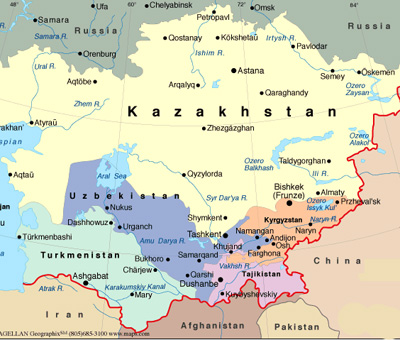 My predecessor Bonnie Boyd completed a 2007 Central Asia Year in Review which you can find to your right and here. She made predictions regarding the CA region for 2008 and since that year is nearly come to pass, how bout we go over them? No, you don't want to? Well, too bad, I’m gonna do it anyway. Bonnie's predictions will be in blocked font and my assessments will be right below in normal type. I myself will do a separate 2008 Year in Review and at the end of this post will be the main questions I will attempt to answer.
My predecessor Bonnie Boyd completed a 2007 Central Asia Year in Review which you can find to your right and here. She made predictions regarding the CA region for 2008 and since that year is nearly come to pass, how bout we go over them? No, you don't want to? Well, too bad, I’m gonna do it anyway. Bonnie's predictions will be in blocked font and my assessments will be right below in normal type. I myself will do a separate 2008 Year in Review and at the end of this post will be the main questions I will attempt to answer.
1. Kazakhstan: The EU and US will fail to make the most of Kazakhstan's OSCE chair, by pressing on a variety of globally-accepted issues in public and undercutting this by worrying about oil and gas in private. The best opportunity is to pick one issue of the social issues, I would choose legal reform, since it ultimately covers everything anyway,and then present a united front on this plus the energy issues‚ including uranium as well as gas.
Unfortunately, Boyd is mostly correct in this prediction as US Assistant Secretary of State for the region, Richard Boucher called the country's political liberalization progress ‘uneven and slow.’ I went over Kazakhstan's progress, or lack there of, in this blog piece and the one positive that can be seen is the work of the OSCE Helsinki Commission in conjunction with several NGOs to help minority political parties, media outlets, and civil society groups to find room to maneuver. As was poignantly stated by Mrs. Zhukova in her lecture I discussed a few days ago, the US definitely showed two faces in dealings with Kazakhstan. Democracy and liberal rights were on the diplomatic schedule, but so were oil and gas business dealings.
2. Uzbekistan: Most likely scenario: the January presidential race in Uzbekistan will leave Islam Karimov in power, with the Uzbekistani people continuing to accept the dismal state of affairs there, or, if possible, voting with their feet to go elsewhere and swelling the already growth industry of poorly paid labor in Kazakhstan, Kyrgyzstan, and the Russian Federation.
Alternate Scenario: The alternate scenario is that Mr. Karimov passes to his post-life reward a la Niyazov, causing an interesting power-play between regionally-entrenched elites within the state, punctuated by isolated demonstrations by people in the Ferghana region, and thus exporting strife to Turkmenistan but especially Kyrgyzstan and Tajikistan, and adding painful incidents to an already abysmal human rights record.
Well, since Karimov's heart is still beating, so I’m gonna have to go with the former. Karimov easily won his reelection and the country was relatively stable throughout the year. However, there were some political openings regarding political prisoners and foreign and domestic media outlets in exchange with more opportunities with the West, but alas, progress in these and other political venues has been slow to say the least.
3. Kyrgyzstan: The Tulip Revolution will further regionalize, presenting new opportunities for destabilizing elements. Bakiev in response will continue to tighten down on security, and democratic gains will be lost. The best hope here is Kazakhstan's interest in economic development of its neighbor and the transfer of diplomatic skills to Kyrgyz leadership,a more long-range position for democratization.
To the disappointment of the Bush administration and many others, the Tulip revolution has so far just been a Kyrgyzstan endeavor. To the pleasure of China, Russia, the region's autocrats, and many others who will live with stability, the governments in the region stayed in charge without serious resistance. Kyrgyzstan's revolution has itself stalled in many ways, as Boyd predicted, especially in regards to religious freedoms, but I would not say that all the democratic gains have been ‘lost.’ Concerning the second part of the prediction, Kazakhstan has indeed continued its rise as the Central Asian economic and political power, but how this may lead to regional democratic gains cannot be easily seen right now.
4. Turkmenistan: President Berdymukhamedov will continue to look for economic opportunities and will create relations with those who give him the most programs for the least trouble. The state will remain isolated. The Trans-Caspian pipeline will mire down in bureaucracy, as Western states will focus upon a variety of issues rather than economic realities. Russia will continue to have the right-hand place at Turkmenistan's table, with Kazakhstan as a sometime broker or mediator for various deals.
Boyd is almost spot on with this prediction, but Turkmenistan's Berdymukhamedov has made several moves to open up his country to further economic gains, which I would argue has curtailed an important facet of its previous isolationist bent. The US and EU have made efforts to get to Turkmenistan's gas and oil reserves, and Berdymukhamedov has been listening, though concrete results and deals have not been forthcoming, including the Trans-Caspian pipeline as Moscow, especially after the Georgian crisis, has attempted to further sink its teeth into the nation's resources. I will discuss Turkmenistan's new outward-looking policy in follow up posts, where I’ll tackle these questions below. Please feel free to offer opinions, arguments, and suggestions regarding this 2008 Year in Review Extravaganza.